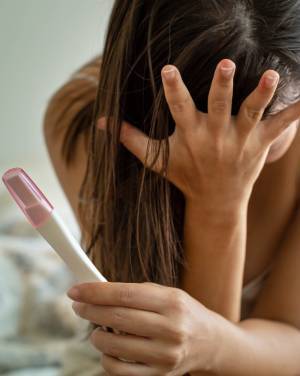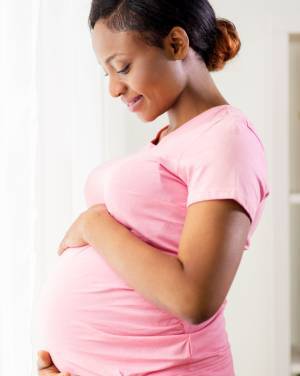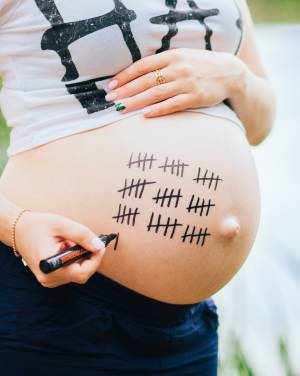Am I Pregnant? — Symptom Checker!
Are you wondering whether you could be pregnant? Perhaps you are experiencing symptoms that might be signs of pregnancy. Or maybe you had a contraceptive failure? If you want to know whether you might be pregnant before taking a home pregnancy test, this page is for you.
Identify your symptoms in a multiple-choice format.
Upon completing the quiz, an immediate evaluation will appear on your screen and be sent to you via email completely free of charge.
This is how the quiz works:
- Identify your symptoms in a multiple-choice format.
- Upon completing the quiz, an immediate evaluation will appear on your screen and be sent to you via email completely free of charge.
- This email contains an evaluation by which you can assess the symptoms you are experiencing and tips on how to proceed.
 1908065980 | Ground Picture | shutterstock.com
1908065980 | Ground Picture | shutterstock.com
Early Pregnancy Symptoms
"Am I pregnant? How can I tell if I am pregnant? What are early signs of pregnancy?" This page explains how to know whether you are pregnant and which symptoms are sure signs of pregnancy.
Top 10 Uncertain Signs of Pregnancy
A study by Sayle et al. (2002) on pregnancy symptoms describes that the first signs of pregnancy only begin with the embryonic stage (starting at the 4th week of pregnancy LMP — counting from the first day of your last menstrual period). This is when the developmental foundation is laid, upon which organ formation can take place. A missed period is usually the first sign of pregnancy, closely followed by nausea, vomiting, fatigue, frequent urination, breast tenderness, and engorgement. Read more about these and other indications of pregnancy below.
First Pregnancy Symptom: A Missed Period
A missed period is one of the most significant signs of pregnancy, as pregnancy always causes menstrual bleeding to cease. However, it is still not a sure sign of pregnancy, as a missed or delayed period can happen for other reasons such as stress, dietary changes, hyperthyroidism, or other illnesses, as well as breastfeeding and the use of hormonal contraceptives.
🤰Missed period — wondering if you could be pregnant? Take our Online Pregnancy Test.
Morning Sickness with or Without Vomiting
While approx. 80% of pregnant women experience the nausea of morning sickness, only 30% also have occasional vomiting. Symptoms are often limited to the morning hours (hence its name), but some feel sick in the afternoon or at night. Morning sickness usually begins around the 5th week of pregnancy, is most pronounced around week 9, and dissipates by week 14. While morning sickness only reaches early into the second trimester in most women, symptoms persist in 20% of those affected until delivery. Although estrogen and the pregnancy hormone HCG appear to be responsible, the exact cause of morning sickness is still unknown.
The good news is that, although highly unpleasant for the expectant mom, morning sickness does not harm the baby. A US-based medical study that investigated the correlation between early pregnancy symptoms and miscarriage (Sapra et al. 2016) even concluded that miscarriage occurs less frequently in women who suffer from vomiting. Excessive vomiting (more than five times a day) accompanied by weight loss occurs in around 0.5-2% of pregnancies. Only in 10% of those affected does the vomiting persist until the birth. When experiencing severe morning sickness, seek medical advice promptly to determine whether medical treatment or even hospitalization is needed.
🥴 Suffering from morning sickness? Read our Seven Pregnancy Hacks on Relieving Nausea and Vomiting.
Breast Tenderness
While swollen breasts can be a sign of pregnancy, this does not occur in every woman. Since sore breasts can also have other causes, this is not a clear sign of pregnancy. Breast tenderness due to pregnancy can occur relatively early, one to two weeks after conception. This is due to hormonal changes. If enlarged breasts are a source of discomfort, wear a well-fitting bra and try massaging with essential lavender oil or baby oil.
Darker Nipples and Areola
Sometimes, increased pigmentation of the nipples and the skin surrounding them (areola) already happens in early pregnancy. Nipples may darken and become larger. The hormone estrogen is responsible for this development, making it easier for the baby to find the breast once it is born.
Bluish Discoloration of Vagina
The darkening of your private area may be another pregnancy symptom known as Chadwick’s Sign. An increased blood flow causes this possible bluish/purple discoloration. However, the following also holds for this sign of pregnancy: It may or may not occur.
Increased Urge to Urinate
Frequent urination is a common symptom, even in early pregnancy. The hormones progesterone and relaxin loosen and relax the muscles, tissue, and ligaments for the uterus to expand. This may also affect the bladder, causing pregnant women to feel the urge to use the bathroom even when the bladder is only slightly full. Additionally, the growing uterus presses against the bladder, and hormones progesterone and ß-hGC cause the kidney to work more efficiently, creating a more frequent need to urinate.
Fatigue
Fatigue is one of the most common signs of early pregnancy. Exhaustion and an increased need for sleep are not unusual, especially during the first trimester. Hormonal changes are responsible for this. However, seeking medical advice to rule out physical causes such as anemia or an underactive thyroid is advisable.
Appetite Changes and Cravings
An increased appetite and food cravings may start early in pregnancy. This is also due to hormonal changes, which affect one's metabolism. Increased insulin production during pregnancy causes a faster drop in blood sugar levels, leading to feeling ravenous.
Stomach Pain/Cramping
Cramping in the lower abdomen may be an early sign of pregnancy. It can occur when a fertilized egg implants in the lining of the uterus. This can also lead to slight spotting (implantation bleeding) and is followed by further changes that may cause abdominal pain. The expansion of the uterus and the stretching of ligaments sometimes cause cramp-like pain.
Mood Swings
Do you feel happy one minute — and like crying the next? Are you longing for closeness one moment and desire to be alone the next? During pregnancy, many women experience an emotional rollercoaster. These intense fluctuations are due to changes in hormone levels in pregnancy and are completely normal. Still, this is not a sure sign of pregnancy since mood swings can also occur with other hormonal changes such as PMS.
Tip: If you would like to read about other signs of early pregnancy and which could have causes other than pregnancy, go to Pregnancy Symptoms for more details.
3 Unmistakable Signs of Pregnancy
These are unmistakable signs of pregnancy that can give you certainty about your pregnancy status:
Pregnancy Test
Pregnancy tests indicate whether the pregnancy hormone ß-hCG is present in your system. There are various ways to test:
Blood Pregnancy Test:
Your medical provider draws your blood to determine the presence of ß-hCG. A blood test can confirm a pregnancy approx. 6-9 days after conception.
Home Pregnancy Test:
Home pregnancy tests also analyze whether ß-hCG is present in your system but test your urine rather than your blood. Standard urine pregnancy tests provide reliable results approximately 14 days after a possible conception. Early result pregnancy tests can be taken a few days before one's period is due, but the result is not as reliable.
Ultrasound
The embryo can be seen on ultrasound by the 5th or 6th week of pregnancy. The surest sign of pregnancy is the fetal heartbeat, which becomes visible on ultrasound between the 6th and 7th week of pregnancy.
Fetal Movements
Fetal movements, which start becoming noticeable around weeks 18-20, are also a scientifically reliable sign of pregnancy.
Our Top Picks for You:
FAQs
-
Changes within your body will make you aware of your pregnancy. The most significant sign is a missed period. Other pregnancy symptoms include abdominal pain, breast tenderness, nausea, fatigue and mood swings. Nevertheless, these symptoms may have other causes. They do not necessarily indicate a pregnancy. So, a urine test is advisable. Ultimately, a pregnancy can only be confirmed by a medical provider.
-
The most telling sign of pregnancy is a missed period. Other signs may include nausea, a heightened sense of smell and mood swings. The presence and intensity of these and other symptoms vary from woman to woman.
-
You can take a pregnancy test as soon as your period is due. If your period is late, a pregnancy test should work. You can also know when to take a test by counting 14 days from the sexual intercourse in question.
An early result test may work a few days before your period is due (refer to the test instructions). However, a negative test may not be conclusive and may need to be repeated later.
-
An online pregnancy test scan does not replace the need for a pregnancy test or online pregnancy quiz. It is a visual means for saving one's pregnancy test results.
Using an app to scan your urine-based home pregnancy test can be helpful for three reasons:
- It eliminates the need to keep the urine pregnancy test, which may become odorous.
- It can be retrieved by the click of a button.
- It enhances any visible lines, making the test result more conclusive.










